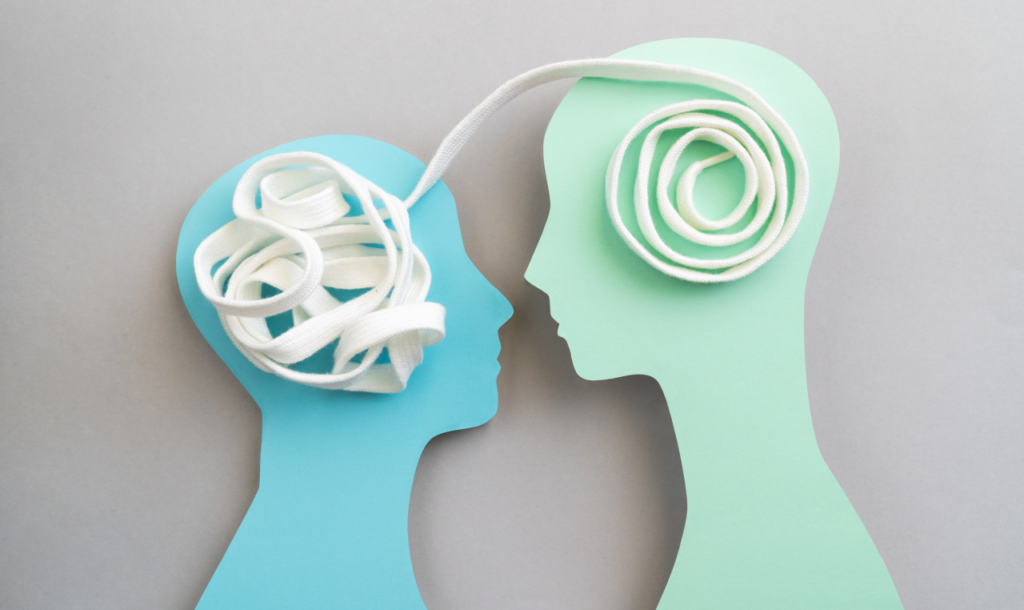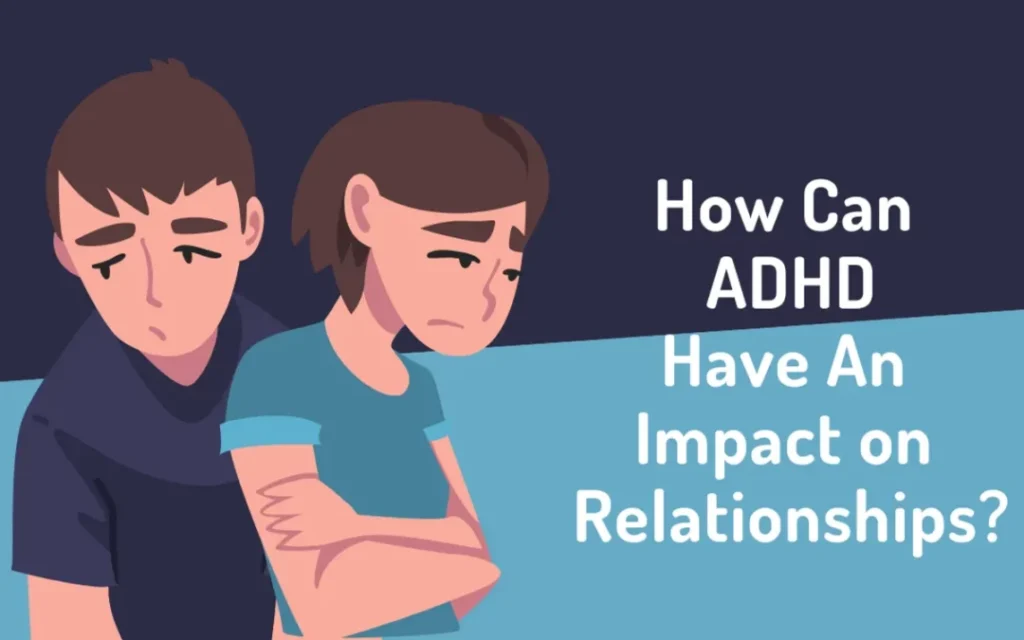ADHD and relationships often create a unique dynamic that can be both rewarding and challenging. Individuals with ADHD may experience difficulties with focus, impulsivity, or emotional regulation, which can impact how they connect with their partners, family, or friends. On the flip side, their energy, creativity, and passion can bring vibrancy to these connections. Understanding the specific challenges ADHD brings to relationships is essential for fostering stronger bonds and creating a foundation of mutual support and communication. This article explores the intricate interplay between ADHD and relationships, offering insights and strategies to navigate the journey together.
Common Challenges in ADHD and Relationships: Understanding the Impact on Daily Life
ADHD can present unique challenges in relationships, often affecting day-to-day interactions in unexpected ways. Partners may struggle with communication breakdowns due to forgetfulness or difficulty focusing during conversations. Emotional outbursts, impulsivity, or a tendency to procrastinate can lead to frustration on both sides. Additionally, individuals with ADHD might unintentionally neglect responsibilities, causing feelings of imbalance in the relationship.
Understanding these common challenges is the first step toward creating a healthier dynamic. By recognizing the ways ADHD manifests in relationships, couples can work together to address issues and find practical solutions that strengthen their bond and improve their daily lives.

The Role of Communication in Navigating ADHD and Relationships
Effective communication is the cornerstone of any successful relationship, and this holds especially true for those navigating the complexities of ADHD and relationships. ADHD symptoms such as distractibility, impulsivity, or forgetfulness can sometimes make clear communication difficult, leading to misunderstandings, hurt feelings, and unresolved conflicts. By prioritizing open, honest, and compassionate communication, couples can overcome these challenges and foster deeper connections.
ADHD and relationships, Challenges in Communication
- Difficulty Staying Focused:
Individuals with ADHD might find it hard to stay engaged during conversations, particularly lengthy or emotionally intense discussions. This can make their partner feel unheard or unimportant. - Impulsive Speech:
ADHD can lead to blurting out thoughts without considering their timing or impact, which might cause unintentional hurt or frustration. - Forgetfulness and Missed Details:
A partner with ADHD may forget crucial aspects of previous conversations, which can be perceived as a lack of interest or care. - Emotional Reactivity:
Emotional dysregulation can escalate minor disagreements into significant arguments, further straining communication.
Strategies to Improve Communication
- Active Listening:
Encourage both partners to practice active listening by maintaining eye contact, minimizing distractions, and summarizing what the other person has said to confirm understanding. - Use “I” Statements:
When discussing issues, frame concerns with “I” statements (e.g., “I feel upset when…”) to avoid placing blame and reduce defensiveness. - Set Clear Expectations:
Clearly outline responsibilities, plans, or agreements to avoid misunderstandings. Written reminders or shared digital tools can help maintain clarity. - Schedule Regular Check-Ins:
Setting aside dedicated time to discuss feelings, plans, or challenges can help both partners feel heard and connected. - Practice Patience and Empathy:
Understanding that ADHD-related behaviors are not intentional can help partners approach conversations with greater compassion.
Tools and Techniques to manage ADHD and relationships
- Visual Aids and Notes:
Writing down key points during discussions can help individuals with ADHD retain and recall important details. - Therapy and Coaching:
Couples therapy, especially with a therapist experienced in ADHD, can provide tailored communication strategies and facilitate healthier dialogue. - Mindfulness Practices:
Mindfulness exercises can help individuals with ADHD stay present during conversations, improving focus and emotional regulation.
Benefits of Strong Communication
When communication improves, the positive ripple effects on the relationship are immense. Partners feel more understood, conflicts are resolved more effectively, and trust deepens. Furthermore, better communication empowers couples to tackle challenges collaboratively, turning ADHD from a source of conflict into a shared journey of growth.
By committing to clear and compassionate communication, couples can navigate ADHD and relationships with greater ease, fostering a partnership built on mutual understanding and respect.
Emotional Dysregulation and Its Effects on Intimacy
Emotional dysregulation is a common challenge for individuals with ADHD and can significantly impact intimacy within relationships. Emotional dysregulation refers to difficulty in managing and controlling emotional responses, often leading to intense outbursts, mood swings, or prolonged emotional distress. When navigating ADHD and relationships, understanding how emotional dysregulation affects intimacy is crucial for building a strong and supportive bond.
How Emotional Dysregulation Impacts Intimacy
- Increased Tension and Conflict:
Emotional dysregulation can lead to heightened reactivity during disagreements, causing minor issues to escalate into major conflicts. This tension can create emotional distance, making intimacy more difficult to maintain. - Difficulty Expressing Affection:
Intimacy thrives on the ability to express love and affection. However, individuals with ADHD may struggle to convey their emotions consistently, leaving their partner feeling neglected or uncertain about their feelings. - Impact on Emotional Safety:
For intimacy to flourish, both partners need to feel emotionally safe. Emotional dysregulation can create an unpredictable environment where one partner may fear triggering an outburst, inhibiting openness and vulnerability. - Strain on Sexual Intimacy:
ADHD and relationships are often affected by how emotional challenges spill over into the physical aspects of intimacy. Stress, frustration, or unresolved emotional tension can lead to a decreased desire for physical closeness.
Strategies to Manage Emotional Dysregulation in adhd and Relationships
- Open Communication About Feelings:
Discussing emotions openly and honestly can help both partners understand each other’s needs and triggers. This creates a foundation for addressing emotional dysregulation collaboratively. - Develop Coping Mechanisms:
Techniques like mindfulness, deep breathing, or taking breaks during heated moments can help individuals with ADHD regulate their emotions more effectively. - Focus on Emotional Validation:
Partners should validate each other’s feelings rather than dismissing or minimizing them. Acknowledging emotions can help de-escalate tense situations and promote understanding. - Seek Professional Support:
Therapy, such as cognitive-behavioral therapy (CBT), can equip individuals with ADHD and their partners with tools to manage emotional dysregulation and improve intimacy. - Create a Predictable Environment:
Reducing external stressors and establishing routines can help minimize emotional volatility, making it easier for intimacy to thrive.

The Positive Impact of Addressing Emotional Dysregulation
When couples proactively address emotional dysregulation, the benefits extend beyond reducing conflict. Improved emotional balance fosters a stronger connection, enabling both partners to feel valued, respected, and safe. As emotional challenges become more manageable, intimacy can flourish, and the relationship becomes a source of comfort and joy.
In the context of ADHD and relationships, understanding and managing emotional dysregulation is a critical step toward nurturing intimacy and creating a harmonious partnership. With patience, communication, and mutual support, couples can overcome these challenges and build a deeper, more meaningful connection.
Read Also : 10 Advice for Dating Someone with ADHD
Building a Supportive Environment: Tips for Partners of ADHD Individuals
Creating a supportive environment is essential for the success and well-being of individuals with ADHD and their relationships. ADHD can bring unique challenges, including forgetfulness, impulsivity, and difficulty with organization. However, a nurturing and understanding partnership can empower individuals with ADHD to thrive while strengthening the bond between both partners. Here are some actionable tips for building a supportive environment in ADHD-affected relationships.
1. Foster Open and Nonjudgmental Communication
- Encourage Honest Conversations: Create a safe space where both partners feel comfortable sharing their feelings, needs, and concerns without fear of criticism or judgment.
- Listen Actively: Pay attention to what your partner is saying, maintain eye contact, and respond empathetically to show understanding and support.
- Set Clear Expectations: Clarify roles, responsibilities, and plans to prevent misunderstandings and reduce stress for the ADHD partner.
2. Learn About ADHD Together
- Educate Yourself: Understanding ADHD and relationships symptoms and how they manifest in daily life can help you empathize with your partner’s experiences.
- Explore Resources: Read books, attend workshops, or consult professionals specializing in ADHD to gain deeper insights.
- Collaborative Problem-Solving: Use the knowledge you gain to work together on strategies for managing ADHD-related challenges.
3. Establish Structure and Routines
- Create Predictable Schedules: Consistency can help individuals with ADHD feel more in control of their environment.
- Use Organizational Tools: Encourage the use of calendars, to-do lists, and reminders to keep track of tasks and deadlines.
- Minimize Distractions: A clutter-free and organized home can reduce overstimulation and improve focus.
4. Practice Patience and Empathy
- Understand Their Struggles: Recognize that behaviors like forgetfulness or impulsivity are symptoms of ADHD, not deliberate actions.
- Avoid Blame: Focus on solving issues together rather than assigning fault when challenges arise.
- Celebrate Progress: Acknowledge small victories and improvements to boost confidence and morale.
5. Support Emotional Well-Being
- Be a Safe Space: Provide reassurance and understanding during moments of emotional dysregulation.
- Encourage Self-Care: Promote activities that help your partner relax and recharge, such as exercise, hobbies, or mindfulness practices.
- Offer Positive Reinforcement: Highlight your partner’s strengths and contributions to counter feelings of inadequacy.
6. Seek Professional Help When Needed
- Couples Therapy: A therapist familiar with ADHD can provide valuable tools and strategies for navigating challenges in the relationship.
- Individual Counseling: Encourage your partner to seek therapy or coaching to develop personalized coping mechanisms.
- Medication and Treatment: If applicable, support your partner in accessing treatments that can help manage their ADHD symptoms.
7. Maintain a Healthy Relationship Dynamic
- Balance Support and Independence: While being supportive, encourage your partner to take ownership of their responsibilities and growth.
- Take Care of Yourself: Make time for self-care to ensure you have the energy and emotional capacity to support your partner.
- Focus on the Positives: Emphasize the unique strengths your partner brings to the relationship, such as creativity, enthusiasm, and spontaneity.
The Benefits of a Supportive Environment
By fostering a supportive environment, partners of individuals with ADHD can help reduce stress and create a more harmonious relationship. This approach not only empowers the ADHD partner to succeed but also strengthens the bond between both individuals. With patience, understanding, and collaboration, ADHD and relationships can coexist in a thriving, loving dynamic.
The Importance of Therapy and Coaching in ADHD and relationships
Therapy and coaching play a crucial role in addressing the unique challenges faced in ADHD and relationships. ADHD symptoms, such as impulsivity, difficulty focusing, and emotional dysregulation, can create stress in relationships. Professional support through therapy and coaching provides tools and strategies that help both partners navigate these complexities, fostering a stronger and more harmonious bond.
Why Therapy Is Essential in ADHD and relationships
- Improved Communication:
Therapy provides a safe space for partners to openly discuss their feelings, frustrations, and needs. A therapist can teach effective communication techniques tailored to ADHD and relationships, helping both individuals express themselves without conflict. - Understanding ADHD’s Impact on the Relationship:
Through therapy, couples can gain a deeper understanding of how ADHD influences their relationship dynamics. This awareness helps to reduce blame and build empathy between partners. - Addressing Emotional Dysregulation:
Emotional dysregulation, common in individuals with ADHD, can strain relationships. Therapists provide strategies to manage intense emotions and de-escalate conflicts, creating a more stable emotional environment. - Conflict Resolution Skills:
ADHD can contribute to recurring arguments due to forgetfulness, impulsivity, or unmet expectations. Therapy equips couples with tools to resolve conflicts constructively and move forward together.
The Role of Coaching in ADHD Relationships
- Practical Solutions for Daily Challenges:
ADHD coaches focus on actionable strategies to manage everyday difficulties, such as organizing tasks, improving time management, and setting achievable goals. This support can reduce stress for both partners. - Building Accountability:
Coaches help individuals with ADHD stay accountable for their commitments, which is crucial for maintaining trust and balance in the relationship. - Enhancing Self-Esteem:
Coaching encourages individuals to recognize their strengths and achievements, boosting confidence and fostering a positive mindset that benefits the relationship. - Empowering the Non-ADHD Partner:
ADHD coaching can also involve the non-ADHD partner, teaching them how to support their loved one effectively without enabling or feeling overwhelmed.
Types of Therapy and Coaching for ADHD and Relationships
- Couples Therapy:
Designed specifically for ADHD-affected relationships, couples therapy addresses both partners’ needs and teaches them how to work together to overcome challenges. - Cognitive Behavioral Therapy (CBT):
CBT helps individuals with ADHD recognize negative thought patterns and develop healthier coping mechanisms, which can reduce relationship stress. - ADHD Coaching:
ADHD-specific coaching provides tailored advice for managing symptoms and improving relationship dynamics. - Mindfulness-Based Therapy:
Mindfulness practices can enhance emotional regulation and focus, benefiting both individuals in the relationship.
Benefits of Therapy and Coaching in ADHD Relationships
- Stronger Emotional Connection:
With professional support, couples can rebuild trust, enhance intimacy, and develop a deeper emotional connection. - Improved Conflict Management:
Therapy and coaching reduce misunderstandings and teach couples to approach disagreements with empathy and patience. - Shared Growth and Understanding:
Both partners learn to navigate ADHD together, turning challenges into opportunities for personal and relational growth. - A More Balanced Dynamic:
Professional guidance helps create a relationship dynamic where both partners feel valued, supported, and heard.
Read Also : Understand Hypersexuality and adhd : Practical Strategies
Final Thoughts
Therapy and coaching are invaluable tools for overcoming the challenges of ADHD and relationships. They provide couples with the skills and understanding necessary to navigate ADHD’s complexities while strengthening their bond. By seeking professional support, partners can foster a relationship that thrives on mutual respect, empathy, and growth, transforming ADHD from a hurdle into a journey of shared resilience and love.
So, Share with us any personal experience about how to manage ADHD and relationships in comments ?


